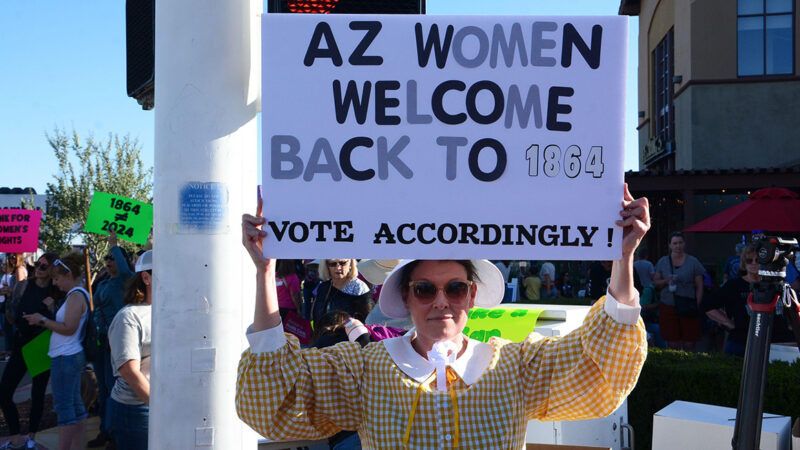Why Some Arizona Republicans Are Defending Abortion Rights
A handful of Republican lawmakers worked with Democrats to repeal an 1864 law banning most abortions.

Though still on the books, Arizona's near-total ban on abortion was buried deep in the state's history—until recently. An April decision from the state's Supreme Court breathed new life into this long-dormant law.
The ban in question—first passed by the territory of Arizona in 1864 and later codified into Arizona state law—mandated two to five years' prison time for intentionally acting "to procure the miscarriage" of a pregnant woman "unless it is necessary to save her life."
This law became unenforceable in 1973 when Roe v. Wade recognized a federal right to an abortion. Since then, the state passed a number of new abortion restrictions, including a March 2022 law prohibiting abortion after 15 weeks' gestation "except in a medical emergency." So when the U.S. Supreme Court overturned Roe in Dobbs v. Jackson Women's Health Organization in June 2022, no one in Arizona knew which state abortion rules to follow.
Mark Brnovich, then the state's attorney general, sought to enforce the more extreme 1864 ban. This led to a legal clash with Planned Parenthood Arizona, which argued that the old ban was superseded by newer laws.
On April 9, the Arizona Supreme Court decided in Planned Parenthood Arizona v. Mayes that the old ban "is now enforceable."
The case was "one of statutory interpretation," as Justice John Lopez IV put it in the majority opinion—not the constitutionality of the old law. The ruling "does not rest on the justices' morals or public policy views regarding abortion," noted Lopez. Rather, it was a matter of determining that Arizona's 2022 abortion law did not "provide independent statutory authority" for repealing or restricting the older ban.
Rather than allow the state to start enforcing the ban immediately, the court remanded the case to a lower court to explore other constitutional issues, suggesting that the older ban could yet be deemed unconstitutional.
Nonetheless, the reaction from Democrats was swift and resolute. President Joe Biden criticized the ruling as "a result of the extreme agenda of Republican elected officials who are committed to ripping away women's freedom." Arizona Attorney General Kris Mayes called the ruling "unconscionable and an affront to freedom."
But even some Republican politicians in Arizona expressed discomfort with the decision. Former Gov. Doug Ducey admitted it was not the outcome he "would have preferred." Current Senate candidate Kari Lake, who previously expressed support for the 1864 law, said she opposed this ruling (though she also later walked this back).
Only a few years ago, such reactions from Republicans would have been surprising. But since Roe was overturned, voters haven't proven very friendly to extreme abortion positions or those who support them. The court's ruling centers abortion in Arizona's political landscape in an election year, tying the Republican Party not to the more moderate abortion restrictions that many Americans can get behind but to the kind of extreme ban that even many conservatives do not support.
Perhaps that's why some Republican lawmakers worked quickly with their Democratic colleagues in the state Legislature to repeal the ban. On April 24, the GOP-controlled House passed a repeal bill, after three Republican representatives joined with Democrats in voting to repeal. The following week, it passed the (also GOP-controlled) Senate, with two conservative senators voting to repeal.
Arizona for Abortion Access has gathered enough signatures to put a measure on the November 2024 ballot that proposes a state constitutional amendment to guarantee that "every individual has a fundamental right to abortion" and that the state cannot interfere with that right "before fetal viability unless justified by a compelling state interest that is achieved by the least restrictive means."
Leaving abortion up to the states is proving a rocky journey. But it may be the path that eventually leads to reproductive freedom in Arizona.
This article originally appeared in print under the headline "Republican Defenders of Abortion in Arizona."


Show Comments (83)